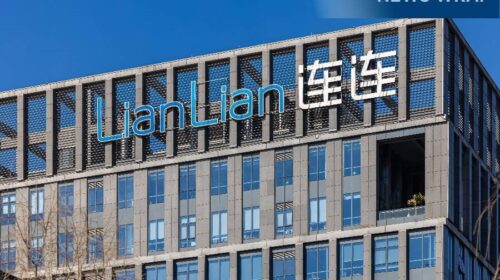Payment app Lianlian seeks IPO relief from cash crunch

The provider of digital payment services for businesses is burning through its funds as market competition heats up
Key Takeaways:
- Lianlian DigiTech’s cash and cash equivalents have dwindled to only 142 million yuan, depleted by years of losses
- The company was valued at a lofty 15 billion yuan after its last round of financing. But achieving a high IPO valuation in a generally weak market will be a tall order
By A. Au
Apps such as Alipay or WeChat Pay have become everyday essentials for Chinese consumers. The transaction services provided by Ant Group and Tencent (0700.HK) dominate the digital wallet market, but another company has carved out a niche in cross-border business payments.
Lianlian Pay, like the better known Alipay, emerged out of Hangzhou. Its parent company, Lianlian DigiTech Co. Ltd., recently made an updated application to list shares on the Hong Kong Stock Exchange after a failed attempt last year.
Founder Zhang Zhengyu set up Lianlian DigiTech in 2009 when Internet-based payment was flourishing in China. After two years the company obtained a business payment license from China’s central bank and officially joined the third-party payment arena. In 2015, it became one of the earliest Chinese providers of international payment services after being granted a cross-border license, which accelerated its shift away from serving individuals. With businesses as its primary clientele, the company insulated itself against direct competition from the more financially robust duo, Alipay and WeChat Pay.
Building a viable payments business depends on gaining operating licenses. By the end of last year, the company had secured 64 payment licenses to operate across more than 100 countries and regions, supporting transactions in 130 currencies. Crucially, Lianlian DigiTech won the endorsement of American Express Co. (AXP.US), the world’s biggest independent credit card company. Their joint venture, Express (Hangzhou) Technology Services, was granted a bank card clearing license in June 2020, putting it on track to become a major player in global payment services.
According to the prospectus, Lianlian DigiTech had 1.10 million Chinese cross-border businesses as its active clients by the end of last September, up 30.5% year on year. The company’s total transaction volume for digital payment has grown steadily, from 849.4 billion yuan ($119 billion) in 2020 to 971.2 billion yuan in 2021, a rise of around 14.3%. The volume rose a further 18.7% to 1.15 trillion yuan last year.
As a result, revenue has also been heading upwards, rising 15.4% to 743 million yuan last year and growing 38.5% to 737 million yuan in the first nine months of 2023 from the year-earlier period.
Lianlian DigiTech benefits from an active user base of more than one million users and takes a cut from every payment it processes from e-commerce platforms. The business model has delivered handsome gross margins of 64.3% in 2020, 68.2% in 2021 and 62.7% the following year. Those figures tell a positive story, but profitability is another matter entirely.
Processing a huge volume of payments for business users has not filled the company’s own bank account. Lianlian DigiTech was 369 million yuan in the red in 2020. The loss more than doubled to 747 million yuan in 2021 and further increased to 917 million yuan in 2022. Together with a loss of 607 million yuan in the first nine months of last year, it reported a cumulative loss of 2.64 billion yuan in the past three and three quarter years.
Cutthroat competition
Intensifying competition is at the heart of the problem. At least 25 players are battling for the cross-border e-commerce payment business, joined in recent years by heavyweights NetEase (9999.HK) and Tencent. Amazon (AMZN.US) has also launched its own payment platform, Amazon Currency Converter for Sellers (ACCS). Besieged by formidable rivals, the company has had to burn through its cash to stay in the fight.
As the filings show, the company’s sales and marketing expenses have risen year after year, surging 54.6% to 140 million yuan in 2022. On top of that, 132 million yuan was spent in the first nine months of last year. At the same time, the company has also been splashing the cash on R&D to improve services and retain customers. R&D spending rose from 124 million yuan in 2020 to 210 million yuan in 2022, followed by 189 million yuan in the first nine months of last year.
Investors might wonder how the company has been able to fund its operations in the face of hefty outgoings.
Institutional investors have been more than willing to stump up the money. As the company was poised to enter markets in the United Kingdom, Ireland and Brazil in 2018, heavyweights such as Everbright Investment piled in with funding of 2.38 billion yuan, at 5.3 yuan per share, sending the company valuation soaring to 4 billion yuan. Several months later another cash injection of 300 million yuan from Sequoia Capital and Boyu Capital took the valuation to 7 billion yuan.
For its third round of financing in June 2019, the company gained funds from the likes of CICC that further boosted its valuation to 12 billion yuan. By October 2020, Taikang Life Insurance and others came on board for a fourth financing round. Their cash infusion of 1.09 billion yuan left the company valued at 15 billion yuan.
After years of losses, Lianlian DigiTech hoped to get some financial relief with a listing on Shanghai’s Nasdaq-like STAR market in 2020, but to no avail. The company shifted its IPO focus to Hong Kong last year. Even if its early investors are in no rush to cash out, the company’s finances are still tight.
Operating cash flow has been on a roller-coaster ride. A negative cash flow of 51.19 million yuan in 2020 was followed by a positive cash flow of 106 million yuan in 2021. Then it slipped back into negative territory to the tune of 33.34 million yuan in 2022. The balance turned positive again in the first nine months of last year, with a cash flow of 45.74 million yuan. However, the company’s cash and cash equivalents had dwindled to just 142 million yuan by the end of September last year. The year-on-year plunge of more than 72% implies an urgent need to raise funds.
But it will not be easy for Lianlian DigiTech to launch itself on the Hong Kong Stock Exchange. Investors will be fretting about the risks of regulatory tightening as well as rising tensions with the U.S., as the company holds sensitive consumer data. To add to the worries, the average daily turnover of the Hong Kong stock market has languished below 100 billion yuan in recent months, and new stocks made lukewarm debuts, falling below their IPO prices. Therefore, the company has its work cut out to deliver a high-value IPO.
For example, Paypal (PYPL.US) has a current price-to-sales (P/S) ratio of only 2.35 times. Assuming the same ratio for Lianlian DigiTech and full-year revenue of around 983 million yuan, based on its nine-month income, the resulting valuation would be 2.3 billion yuan, far below the 15 billion yuan after the last fundraising round.
The Bamboo Works offers a wide-ranging mix of coverage on U.S.- and Hong Kong-listed Chinese companies, including some sponsored content. For additional queries, including questions on individual articles, please contact us by clicking here.
To subscribe to Bamboo Works free weekly newsletter, click here






